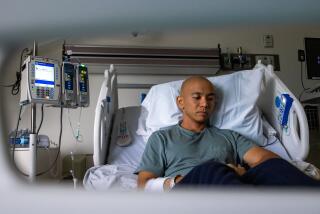Untimely Nick Delays Bride’s Gift of Kidney
SAN DIEGO — A nationally publicized kidney transplant operation involving two newlyweds was postponed Wednesday when a radiologist performing a routine test on the Mission Viejo donor nicked an artery in her left kidney, imperiling her ability to donate her other kidney to the man who needs it to stay alive.
There is some chance the organ transplant may be canceled altogether as a result of the injury to 45-year-old Victoria Ingram-Curlee, who had been scheduled to donate her right kidney Wednesday to Randall Curlee, 46, a gravely ill diabetic whom she had married in the hospital chapel 24 hours earlier.
Doctors at Sharp Memorial Hospital, where the operation was scheduled to be performed, said Ingram-Curlee will need three to four weeks to heal before surgeons can determine whether she remains the almost-perfect donor they believed her to be Wednesday morning.
Dr. Robert Mendez, director of renal transplantation at Sharp Memorial and a veteran of 3,000 kidney operations, said Wednesday’s mishap produced a “25% to 35%” chance that Ingram-Curlee will be unable to donate either kidney to Curlee, who needs the new organ because of his advanced diabetes.
“I am very disappointed, but the way I’m looking at this, it’s just a minor setback,” Ingram-Curlee said in a statement released by the hospital. “I’ll heal quickly and we’ll proceed as planned. We don’t want this to impact other donors. What happened today is very rare, and we don’t intend to let it get in the way.”
“I am concerned about Victoria,” Curlee said in his statement. “She’s an amazing person, and, of course, wants to go ahead immediately. It’s an unfortunate complication, but I want Victoria to be completely well. We’ll go ahead when she is better.”
The couple’s unusual romance had captured national attention, leading to interviews on “Good Morning, America” and the “Today” show before they exchanged vows in the hospital’s chapel Tuesday morning.
Mendez said the incident occurred during an “X-ray assessment” of Ingram-Curlee’s left kidney, which doctors needed to evaluate before they could remove and transplant her right one. He said doctors prefer using the left kidney in transplants, because “the renal vein is longer,” making the operation easier and safer from a technical standpoint.
The incident occurred during an arteriogram, a procedure designed to “assess the normalcy of the kidneys, the anatomy of the kidneys,” Mendez said.
But when the radiologist--whom Mendez identified as Dr. Harold Coons--began his “routine preoperative procedure” at 8 a.m. Wednesday, 6 1/2 hours before surgery, he discovered that blood flowed through three arteries in Ingram-Curlee’s left kidney, rather than the usual one, Mendez said.
Coons inserted a narrow catheter tube into the arteries in order to inject a dye that would help him evaluate how well blood flowed through those vessels, Mendez said.
“During the assessment of these arteries, a small accessory artery . . . was nicked, partially compromising the blood supply to a lower area of the kidney,” he said.
Mendez called the incident “very unfortunate,” saying it occurs “very rarely.” He said Coons--who could not be reached for comment--”doesn’t feel very good about it.”
Medical experts said such injuries are rare but well-known risks when undertaking such procedures. Dr. Ervin Ruzics , director of kidney transplantation at UC Irvine Medical Center in Irvine, said it would be “incorrect” to call Wednesday’s incident “a slip-up.”
“Anytime you invade the human body, anytime you put an instrument or a catheter in the human body, these are the things that can occur,” Ruzics said. “It’s just the nature of the beast. It sounds self-serving for a physician to say, but sometimes no amount of caution can prevent such occurrences.”
A San Diego radiologist who is not associated with Coons’ practice said Wednesday that “if I was going to have an arteriogram by somebody, I would want it performed by (Coons). He’s one of the top 20 in the country.”
Neither Curlee nor his wife wanted to face the media on Wednesday, according to hospital spokeswoman Cathy Spearnak. Curlee will be released from the hospital today, Mendez said, and his bride will be released Friday or Saturday.
The newlyweds met two years ago at an open house that Ingram-Curlee, an Orange County real estate agent, was holding in Curlee’s neighborhood. “I was planning on selling my house,” he later told reporters, and walked in, only to meet the woman of his dreams.
Curlee’s diabetes was diagnosed in his teens and has suffered many of the complications associated with the disease, including kidney failure, a heart attack and vision problems. He takes insulin injections twice a day.
Shortly after Curlee learned he would need a kidney transplant, he brought his fiancee to the doctor to show her what she would face when she married him. She offered to be tested as a donor, and despite the low expectations of Curlee’s medical advisers, Ingram-Curlee proved to be what Mendez called an astonishing, almost-perfect match.
Ingram-Curlee’s kidney matched Curlee’s on two out of six vitally important criteria, “but they were the most important,” Mendez said.
Curlee probably will not need dialysis treatments while he awaits the transplant but will be evaluated daily for the next two to four weeks, Mendez said. At the end of that time, he will either receive one of his wife’s kidneys or one from another donor.
Because of what he called “an incredible barrage” of national publicity, Mendez said the chances of finding a suitable donor--other than Ingram-Curlee--had been “greatly increased.”
But approximately 36,000 people are on the waiting list for kidneys, and only about 4,000 kidneys become available each year. Most come from patients who die in hospitals. Live transplants usually come from blood relatives, but Curlee’s relatives were not compatible.
More to Read
Sign up for Essential California
The most important California stories and recommendations in your inbox every morning.
You may occasionally receive promotional content from the Los Angeles Times.









